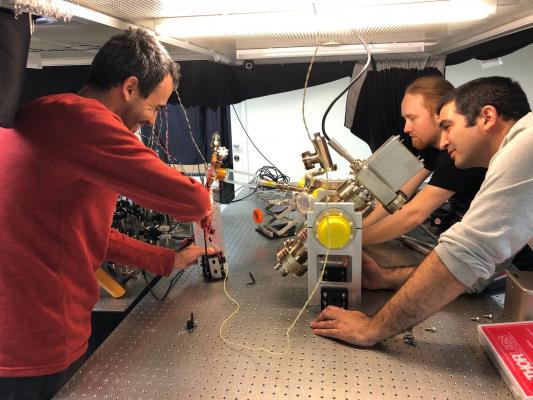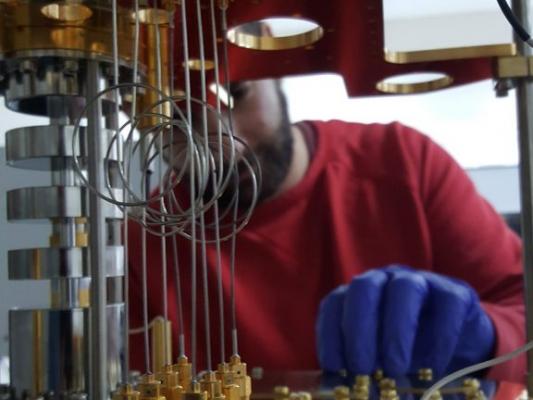Why get your degree from the Technion?
The Technion, the first and leading institute of Technology in Israel, offers world-class teaching and research opportunities in Quantum Science and Technology (QST). It encompasses first-class engineering along with leading science faculties.
The Technion has been the nucleus of the high-tech industry in northern Israel and provides much of the skilled manpower to the high-tech and defense industry. Israel, well known as the start-up nation, owes this status, in no small measure, to the Technion.
A degree from the Technion offers a unique opportunity to further your career in QST.
The Technion has a distinguished tradition in Quantum theory, going back to Nathan Rosen, of the Einstein-Podolsky-Rosen famous work on entanglement and to Asher Peres, one of the six fathers of Quantum teleportation.
The Technion offers active and leading research groups in the focal areas of QST:
1. Quantum Computation
2. Quantum Information and Communication
3. Simulation of Quantum Systems and Photonics
4. Quantum Sensing
5. Quantum Materials
Two departments at the Technion- Chemistry and Physics - offer an MSc program with a certificate of specialization in QST.
The Computer Science department offers a secondary specialization in Quantum Computing for Bachelor's Degree.
To enroll at the Technion’s undergraduate school please follow this link.
To enroll at the Technion Irvin and Joan Jacobs graduate school towards an MSc or PhD degree, please follow this link.
For additional information and questions you may have, you are welcome to contact the following faculty representatives:
Prof. Guy Bartal - Faculty of Electrical Engineering
Prof. Yachin Ivry - Faculty of Materials and Science and Engineering
Prof. Tal Mor - Faculty of Computer Sciences
Prof. Aharon Blank - Faculty of Chemistry
Prof. Yosi Avron - Faculty of Physics
Prof. Steven-Howard Frankel - Faculty of Mechanical Engineering
- Specialization in “Quantum and molecular technology” (Chemistry MSc program)
-
Quantum technologies are a collection of methods that use the Quantum properties of particles for practical applications, such as Quantum Computers, Quantum Communication, and Quantum Sensing. The Molecular Quantum Technology program will focus on unique aspects of the Quantum field that are particularly relevant to Chemistry, such as molecular Quantum Computers, magnetic resonance Quantum Sensors, applications of Quantum Computers in theoretical Chemistry, and Quantum Mechanics theory in molecular aspects. This is an innovative field of research that will lead to technological revolutions in the 21st century.
Any student who has received a Master's degree in Chemistry (average of at least 80 undergraduate degrees + a personal interview) will be eligible for admission to the Molecular Quantum Technology course.
The subject of the research that the student will be engaged in during its master's degree has to be linked to Quantum Technology.
In addition to a master's degree diploma, the graduates will also receive a special certificate in "Quantum Molecular Technology" as an appendix to the Diploma.
The following are the educational requirements:
A three-year graduate is required to complete at least 11.5 points within the framework of the points for which he is required for a master's degree.An engineering graduate (4 years) will be required for 5.5 points when he can do the core courses and elective courses only if he has the appropriate preliminaries. He also must attend the course "Introduction to Quantum Molecular Technology" during undergraduate studies.
The program requirements :
1. 7.5 credit points from the following "core courses": (4 points for graduates of the four years degree)
a. "Introduction to molecular quantum tech" (127446)- 3.5 credit points
Four years degree graduates will be required to take this course (or its equivalent) in the framework of their undergraduate studies.
b. "Applications of molecular quantum tech" (127447) – 2 credit points
c. "Quantum Technology lab (a)" (126604)- 2 credit points OR"Advanced Quantum Technology Lab (b)" (126605)- 4 credit points
2. 4 additional points from one of the following courses:
a. "Biophotochemistry and quantum properties" (127450)- 2 credit points
b. "Quantum control & measurement in P Chem" (127452)- 3 credit points
c. "Physical chemistry of quantum materials" (127451)- 3 credit points
d. "Advanced experimental methods in NR" (128429)- 2 credit points
e. "Noisy quantum computing" (116037)- 2 credit points
f. "Advanced quantum information theory" (116040) )- 2 credit points
g. "Quantum of radiation and matter" (118137)- 3.5 credit points - Specialization in Quantum Science & Technology (Physics MSc program)
-
Master’s students in the Department of Physics are eligible to receive a specialization certificate in “Quantum Science & Technology” (addendum to their diploma) in addition to their Master’s degree, subject to fulfilling the following conditions:
Completing all the requirements for a Master of Science degree in Physics.
Completing all the academic requirements for the specialization program, as detailed below.
The research subject for the degree must be in the field of Quantum Science and Technology.
Following are the academic requirements for specializing in Quantum Science & Technology:Prerequisites
Students who do not have a degree in Physics or in joint Physics tracks from the Technion and who lack the pre-requisites courses listed below, will be required to complete these classes as part of the credits required for their Master’s degree.
Prerequisite courses:
1.Quantum Mechanics 1
2. Solid State 116217 or Optics 114210 or Lab 5 T 114259 or Lab 6 T 114250
Required Courses
The required courses for a Master’s degree in the Department of Physics (Quantum Mechanics 3 and Statistical Mechanics 2) are mandatory for receiving a Master of Science degree in Physics.
The courses “Quantum Technologies” (116083) and “Theory of Quantum Information” (116031) are mandatory for receiving the specialization certificate.
Students who completed these required courses as part of their Bachelor’s degree are exempt.
Special Requirements for Receiving a Specialization Certificate
Graduates of a three-year degree program, will be required to complete at least 10 credits in the program’s core subjects, as part of the credits for their Master’s degree.
Graduates of a four-year Engineering degree will be required to complete at least six credits in the program’s core subjects, as part of the credits for their Master’s degree.
Core Courses
Quantum Technologies (116083)
Theory of Quantum Information (116031)
Advanced Quantum Information (116040)
Photon-Atom interactions (118137)
Laser Physics and Quantum Optics (116041)
Atoms and Molecules Physics (116039)
Quantum Theory of Matter 1 (116035) or Solid State for Graduates (118138)
Quantum Theory of Matter 2 (118143) Advanced Solid State Physics (118128)
Quantum Theory of Matter 3 )118144( or Many-body Theory )118018)
Noisy Quantum Computing (116037)
Experimental Methods in Correlated Electrons (117004)
Geometric Methods in Physics (118092)
Macroscopic Quantum Systems (116034) or Superconductivity and Superfluidity (117021)
Semiconductor Based Quantum Structures (116036)
Alternative Core Courses offered by other Faculties at the Technion:Complexity Theory (236313, Taub Faculty of Computer Science)
Introduction to Coding Theory (236309, Taub Faculty of Computer Science)
Topics in Nano-Electronics (046232, Viterbi Faculty of Electrical and Computer Engineering)
Quantum Technologies (046243, Viterbi Faculty of Electrical and Computer Engineering)for additional details-please contact the Physics faculty
- Secondary Specialization Program in "Quantum Computing" (Computer Science – all undergraduate tracks including joint programs)
-
The field of quantum computing and quantum information (including quantum communication and cryptography) is evolving all over the world at an ever-increasing rate. The Computer Science Faculty, in coordination with the Helen Diller Quantum Center, is offering a scientific enrichment program (p.237 in the courses catalogue) for this field. The program will provide the students with a multidisciplinary aspect of this developing area.
The program is open to undergraduate students in the Faculty. A student can join the program after earning at least 30 credit points with an average score of 85, and with the advisor's approval, also an average score between 80 and 85 is accepted.
Students who complete the secondary specialization program will receive a certificate confirming successful fulfillment of the program. The certificate will be signed by the Dean of the Computer Science Faculty and the Head of the Quantum Center. The certificate will be granted only after completion of all the Bachelor's degree requirements in one of the Faculty tracks, as well as the requirements of the secondary specialization program. The follow up on the completion of the secondary specialization program requirements will be done by the Undergraduate Secretariat of the Faculty.
In order to complete the program, it is required to learn five courses out of a package of courses as detailed below. Overlapping is allowed between courses of the secondary specialization program and courses (mandatory and electives) that the students take in the framework of their undergraduate studies. Students in three-year programs must complete at least 2.5 credit points beyond the credits required in their regular program. Students in four-year programs are not required to add points.
Students are required to take the following two courses:
a) Introduction to Quantum Information Processing * (236990) 3 cr.* Students are allowed to exchange the course Introduction to Quantum Information Processing with the course Quantum Information Theory (116031) 3.5 cr.
b) Theory of Computation (236343) 3 cr.Students must complete three of the following four requirements:
a) Quantum Chemistry 1 ** (1) (124400) 5 cr.** Students are allowed to exchange the course Quantum Chemistry 1 with the course Quantum Physics 1 (115203, 5 cr., suitable for CS-Physics track), or with the course Quantum Mechanics (046241, 3 cr., suitable for Computer Engineering track).
b) Advanced Course in Quantum Information: One course from the following list: Advanced Topics in Quantum Information (236640/41) 2/3 cr., Seminar in Quantum Information Processing (236823) 2 cr., Advanced Quantum Information (116040) 2 cr.
c) Advanced Course in Quantum Technologies: One course from the following list: Quantum Technologies (046243) 3 cr., Quantum Technologies (116083) 2 cr., Project in Quantum Computing (236991) 3 cr., Noisy Quantum Computing (116037) 2 cr., Laboratory in Quantum Technologies A (126604) 2 cr., Laboratory in Quantum Technologies B (126605) 4 cr.
d) Core course: One course from the following list: Complexity Theory (236313) 3 cr., Introduction to Coding Theory (236309) 3 cr., Communication Complexity (236518) 2 cr., Algorithms 2 (236359) 3 cr., Approximation Algorithms (236521) 2 cr., Introduction to Optimization (236330) 3 cr., or Computational Methods in Optimization (046197) 3 cr., Logic for CS (2) (234292) 3 cr., Signal, Image, and Data Processing (236200) 4 cr., Network Security (236350) 3 cr., Modern Cryptology (236506) 3 cr., Introduction to Computer Networks (236334) 3 cr., or Computer Networks and Internet 1 (044334) 3 cr., Concurrent and Distributed Programming (236370) 3 cr., Introduction to Artificial Intelligence (236501) 3 cr.Remarks:
(1) Please pay attention to the four prerequisites of the course Quantum Chemistry 1:Physics 2 (114052), and Principles of Chemistry (124120) – which appear in the "List of Scientific Courses"/"Physics-Chemistry" chain.
Ordinary Differential Equations/H (104131) contained in Ordinary Differential Equations/T (104135), and Differential and Integral Calculus 2 (104004) contained in Calculus 2M (104032) plus Vector Analysis (104033) – the two containing courses above 104135 and 104033 appear in the list of "Additional Mathematical Course".
The list of scientific courses and the list of additional mathematical courses appear in the Four-Year CS General Track.
(2) The logic for CS – only for students in the Computer Engineering track - Secondary specialization program in "Quantum Technologies" (Electrical & Computers Engineering undergraduate students)
-
The Electrical & Computer Engineering Faculty, in coordination with the Helen Diller Quantum Center, is offering a scientific enrichment program (p.7,10,13,16 in the courses catalogue) for this field. The program will provide the students with a multidisciplinary aspect of this developing area.


